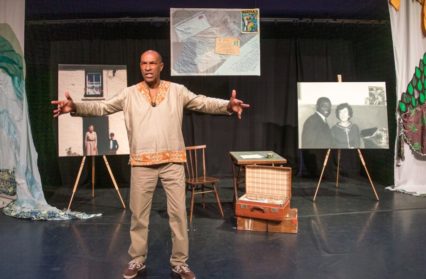Josh Ludewig went along to Chapter to see The Gods Are All Here, a compelling, one-man performance from first-class storyteller, Phil Okwedy.
Cardiff-born storyteller Phil Okwedy has teamed up with producers, Adverse Camber and Theatrau Sir Gâr, to share Okwedy’s personal story about growing up without his birth parents in 1960 and 70s Wales. A story of inequality, freedom, racism, and family, delivered in a touching, funny and evocative performance, The Gods Are All Here is a deeply intimate story, with themes that still resonate strongly in today’s landscape.
Okwedy never lived with either of his parents, but was raised in Pembrokeshire by his long-term foster mother, his aunty Barbara. Charting the time of life when children are said to view their parents as gods, Phil was inspired to tell his tale after finding letters between his mother based in Neath and his father in Nigeria, when clearing out his mother’s flat after her death. The letters offered a unique opportunity to question his story, leading Phil to wonder whether he could find the parents he had never had through these letters, and whether they really were gods, as he had once imagined them to be.
The show begins with Okwedy coming out onto the stage singing the lines “None of us are free, None of us are free, None of us are free, one of us in chains, None of us are free.” At first, you are aware of the sense of awkwardness which fills the audience, but as he continues, Okwedy’s natural presence and calm charisma begin to fill the air, with the atmosphere changing to one of intrigue.
Okwedy expertly combines two tales, with assistance from Director Michael Harvey. First, Okwedy introduces the tale of Mami Wata, transporting the audience to Nigeria, before he then drags them back to Wales with an honest recollection of his childhood. While both tales have sombre tones to them, the performance never felt dark or sad, largely thanks to Okwedy’s ability to allow his natural character to shine through when expressing these moments of sadness, moments which are made easier to digest thanks to Okwedy being warm and welcoming. Rather than lingering on the sadness of these moments, audiences are drawn into the tale by Okwedy’s easy-going nature.
Both are deeply compelling tales for different reasons. The tale of Mami Wata, where a young woman begins a lifelong journey to right a wrong, is a tale of magic, slavery, and adventure, whereas Okwedy’s is a tale much closer to home of identity, racism and belonging. While separated by time, and many of their themes, the tales both deal with challenge and recovery, linking the two together.
Throughout the play, Okwedy moves between recounting this legend and reflecting on real life. While this could feel tedious, Okwedy’s sincere storytelling carries the narrative and easily captivates his audience. This captivation is further strengthened by Okwedy’s use of simple and clear language, which allows both tales to be easily followed. Okwedy and Adverse Camber productions have enhanced the production, making further efforts for the story to be followed by having a BSL interpreter present, making the experience more accessible.
Elanor Higgins’ lighting design should also be noted, especially the use of transitional lighting with cold lighting signifying Okwedy’s own tale and warm lighting for the legend of Mami Wata, perhaps further inducing the sense of distance Okwedy felt from his parents. The set, designed by Molara Adesigbin, was a simplistic yet evocative design consisting of pale almost tapestry-like curtains portraying story beats from the Mami Wata tale, looming in the background just as the tale does in Okwedy’s parents’ story. With this in mind, it is only appropriate that the foreground of the stage is made up of photos of Okwedy’s biological parents and foster parent.
The Gods Are All Here sees Okwedy masterfully weave myth with his own story, informing one to the other. The performance demonstrates how we all have a story or myth inside us, as Okwedy says “The Gods Are All Here” inside of us, we create myth, we create the gods – something that connects us all no matter our differences. Ultimately, Okwedy uses his personal story to empower and connect us.
The Gods Are All Here is currently on tour, details are available here. You can read more about how the show came together in Jasmine Okai’s interview with Phil Okwedy and Michael Harvey.










